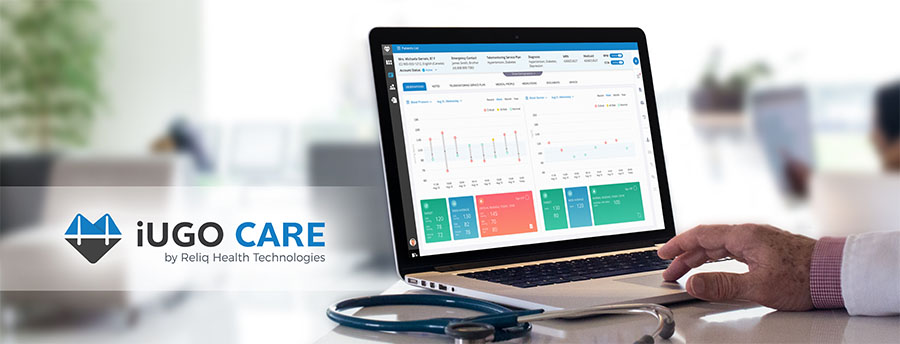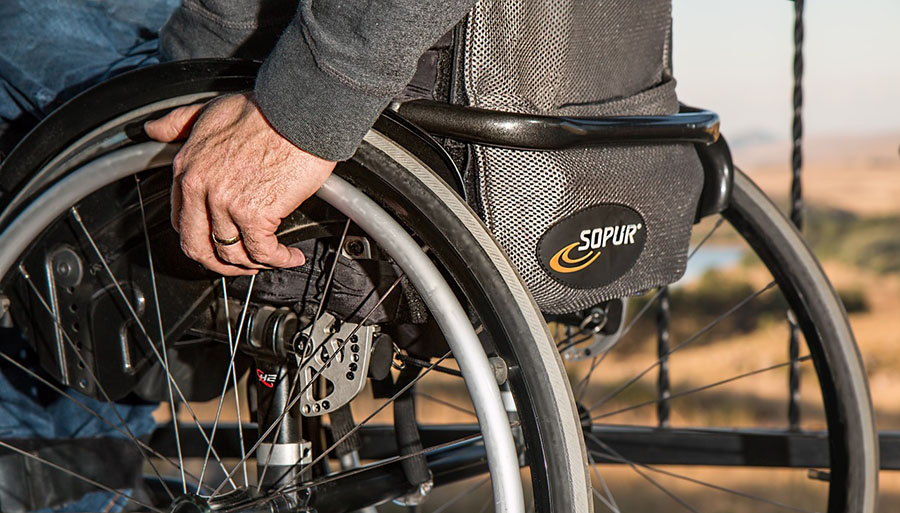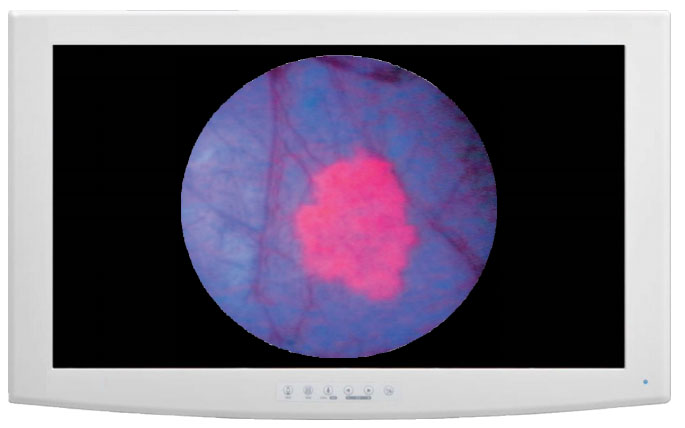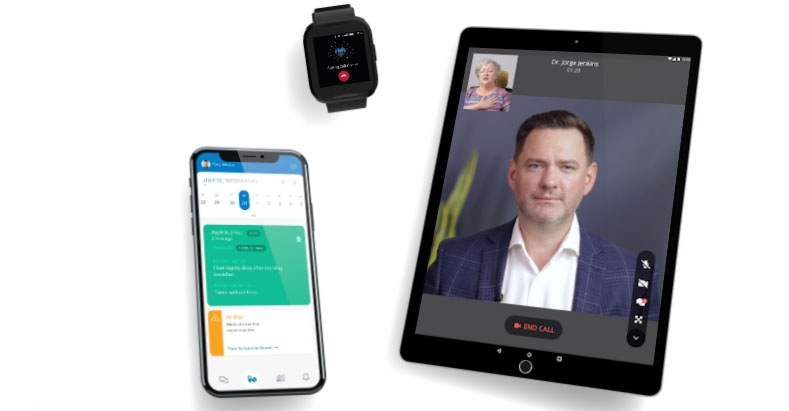A sweeping new development in what federal Medicare and Medicaid covers for seniors and low income patients across America has suddenly quadrupled the market potential for Reliq Health Technologies Inc. (RHT:TSX.V; RQHTF:OTCQB). This, after the company has already reestablished itself as a community care technology leader. The results have led to parabolic trajectory that still has plenty of upside. Indeed, by mid-October the stock reached a 52-week high of $0.72 after touching a year low of $0.165. If you look at the one-year chart (below) as of mid-October, you see cereal-bowl showing the correction after the company uncovered significant sabotage by a group of employees and was forced to clean house. Led by CEO, Dr. Lisa Crossley, Reliq has persevered and the industry is showing a glowing endorsement for the company and its cloud-based technology. After landing a stream of new contracts since the summer, it looks like Reliq's place in the industry is solidified. As recently as October 15 the company announced that it has signed contracts with five new Home Health Agencies in Texas to go live on its iUGO CARE platform.
Adding more fuel to its parabolic growth the company just announced in late October that it has just signed another six new contracts with clients in California, Montana and Texas, then signed a partnership with a U.S. pharmacy network with patients in 10 states, and another partnership with a US diabetes care company.
In its recently released forecast for FY 2020, Reliq expects to have 10,000 patients on-boarded to its iUGO CARE platform by Dec. 31, 2019, 20,000 patients on-boarded by March 31, 2020, and over 35,000 patients on-boarded by June 30, 2020. The company expects to double revenue every quarter through FY 2020 (July 1, 2019, to June 30, 2020). This equates to a growth of roughly $3 million to $10.5 million—in subscriptions alone—or a 350% growth million in just six months.
If this momentum continues, Reliq could see itself on a run towards its 3-year high of $2.46 when it had about only about 24% less shares out. Back in March 2018, RHT it had about 100 million shares out for a market cap of about $245 million versus now with 124 million out at $0.65 for a current market cap of $80 million, with more clients in the pipeline than ever.
Said Dr. Crossley of the recent big wins, "We continue to add new clients in multiple states and different verticals. It is gratifying to see the private payers following the precedent set by the Centers for Medicare and Medicaid Services (CMS) in providing reimbursement for Remote Patient Monitoring (RPM)."

Allow me to also point to another chart developed by researcher Clive Maude who said in relation to the more recent six-month run up to Oct. 11 below, "The current relatively light volume and proximity of the price to the parabolic uptrend boundary suggests that it is now ready to embark on the next up-leg."

Reliq, a "technology company focused on developing innovative mobile health (mHealth) and telemedicine solutions for community-based healthcare," has anchor clients established in New Jersey, Maryland, Texas and has now added footholds in California and Montana. The company has expanded its U.S. sales team with senior salespeople Arizona, California, Florida, New Jersey, Pennsylvania, and Texas. Near-term opportunities in the U.S. Sales pipeline span over 15 states. On Oct. 28 the company announced that it has partnered with a U.S. pharmacy network to offer Reliq's iUGO CARE remote patient monitoring platform to its chronic disease patients across 10 States, primarily on the U.S. East Coast.
On October 30, the company announced it has partnered with leading U.S. diabetes care company Smart Meter LLC (Tampa, Fla.) to provide Reliq's iUGO CARE Remote Patient Monitoring (RPM) and Chronic Care Management (CCM) solutions to patients coping with diabetes and other chronic conditions.
More joy is in store for patient shareholders that held on and new ones that joined in as Reliq expects to achieve cash flow positive this quarter. The sweetener is that the company is NOT currently contemplating an equity raise and does not anticipate needing to raise outside capital in order to reach profitability in 2020, so the near-team stock momentum should not be bogged down by any further share dilution.
An Overlooked, Underappreciated Market Takes Flight
It's not surprising the old "80-20 rule" applies in healthcare in America where roughly 80% of the costs are applied to 20 percent of the population, that being the elderly and those with the lowest income. The numbers in the U.S. are staggering. The Centers for Medicaid and Medicare Services (CMS) spent over $1.5 trillion on healthcare in 2018, over 6% of U.S. GDP.
In the U.S. there are two relevant government-funded health insurance programs. Medicaid is a program for low income individuals. It is jointly funded by the federal and state governments and administered by the states. Each state sets its own criteria for eligibility for Medicaid. Medicare is a federal program for disabled persons and anyone over the age of 65, regardless of income. Eligibility criteria for Medicare are set by the federal government and apply nationwide.
Up until 2019, remote patient monitoring (RPM) was covered by Medicaid, but only in 21 states, and could only be billed by physicians. As of this year, however, CMS is allowing home health agencies to bill Medicaid directly to increase utilization of RPM, and Medicare now covers RPM for its patients. In addition, CMS expanded the billing codes for RPM, more than doubling the potential reimbursement for providers by adding coverage for initial setup and training, patient education, device/transmission fees and other services. These changes expand the potential market for Reliq in the RPM space from less than 20 million patients to over 80 million patients, with the coverage for additional services dramatically increasing the market pull for Reliq's services.
In January 2019, CMS introduced new billing codes for physicians and clinicians to cover remote patient monitoring of physiologic parameters such as weight, blood pressure, pulse oximetry, respiratory flow, and for monitoring related device to supply daily recordings, programmed alerts and monthly reporting. There are also federal reimbursable codes for remote monitoring of treatment management services, 20 minutes or more of clinical staff, physicians and other qualified healthcare professional time in a calendar month requiring interactive communication with the patient/caregiver during the month.
These billing code developments are significant when you are targeting a full 20% of the entire U.S. population as a potential customer base. In fact, hospitals, doctors and clinicians are now rewarded for keeping chronic disease patients healthy and out of the hospital, and they are penalized—as in they have to pay money back to the government—if patients are readmitted to hospitals within 30 days of discharge,so there is a huge incentive for healthcare professionals adapt preventative measures. Consider that a typical community health clinic is reimbursed by Medicare/Medicaid a minimum of $300 per month, per patient, for the above billing codes. Its cost to Relic ranges from $25–$50 per month, per patient, so it's a win-win scenario. Even better for Reliq, the company updated its client contracts such that it now bills clients for its services monthly with payment due irrespective of whether or when the client (clinic, hospital, doctor) is reimbursed by Medicare or Medicaid. To enable this, Reliq provides pre-qualification screening for its clients to give them comfort of reimbursement.
To put all this into perspective, CMS has dedicated billions to reimbursement for RPM and CCM, with the expectation that these services will significantly reduce its current annual spend of $1.3 trillion.
"This year, these changes to Medicare and Medicaid have more than quadrupled our market potential," says Dr. Crossley. Reliq's platform is delivered in a high-margin, cloud-based software as a service model, and what tech investors love to see is continued growth and potential growth recurring revenue. Now that the company has resolved the collectability issues it faced in 2018 and recovered from the bad acts of several former key employees, it has successfully rebuilt its credibility with clients, as evidenced by the 30 new contracts announced since August 2019.
Competition: Thin
So, if this is such massive, high-margin market, where is everybody?; what's the competition? Crossley points to only a couple of small regional competitors but the recent wins are establishing Reliq as the clear leader. So where are the big healthcare tech giants on this? Crossley says they are focused on what have traditionally been the bigger fish in healthcare. "Historically all of the big dollars have been spent on hospitals and acute care settings. The platforms that sell to hospitals are very, very expensive, they tend to have large, multi-million-dollar upfront capital costs, with high maintenance and support costs going forward. That's not going to work in the community setting where the care providers serving rural, remote, low income and other underserved communities do not have the budget or the internal IT resources to implement a complex, costly software platform."
"Hospitals need their post-discharge software platforms to integrate with their Electronic Medical Record (EMR) systems. The big EMR providers like Epic or Cerner don't really want anyone touching their data, so it's a very costly and complex endeavor to deploy a solution to hospitals. Hospitals are high maintenance clients that require a lot of ongoing support. Reliq focuses instead on care providers in the community, serving populations the big healthcare technology companies have never seen as a potential profit center. We purposefully built our cloud-based platform to be lightweight, easy to implement and easy to use so that it would be viable in the community setting, but we also made it scalable, secure and robust so that we can support virtually limitless numbers of patients and care providers.”
The Focus Is Prevention
Company literature describes Reliq Health Technologies as "a healthcare technology company that specializes in developing software solutions for the Community Care market." Its focus is on preventive care, which if administered properly can save healthcare systems billions of dollars. Reliq's iUGO CARE platform supports care coordination and community-based healthcare and integrates wearables, sensors, voice technology and intuitive mobile apps and desktop user interfaces for patients, clinicians and healthcare administrators.
iUGO Care allows complex patients to receive quality care at home, thus improving health outcomes, enhancing quality of life for patients and families and reducing the cost of care delivery. The platform provides real-time access to remote patient monitoring data, allowing for timely interventions by the care team to prevent costly hospital readmissions and ER visits.
"Over 90% of Medicare and Medicaid spending is driven by chronic disease patients," says Crossley. "Governments in the past have cut healthcare costs by closing beds in hospitals or consolidating little local hospitals into one larger regional care center, but that's essentially re-arranging the deck chairs on the Titanic. You're not doing anything that's going to move the needle because where all the money is being spent is on the chronic disease patients and the only way to spend less on them isn't just to discharge them a day early after open heart surgery—it's to prevent the need for the open heart surgery in the first place. The key is now proactive medicine and the way that you reduce preventable complications is through daily monitoring. We also have a medication compliance component, where seniors are reminded to take their meds. The failure to properly take their medication accounts for about half of hospitalizations in the chronic disease population. The patient skips his meds and end up in a diabetic crisis, or misses his morning dose of blood pressure medication and takes twice as much at night to make up for the missed dose, so his blood pressure crashes and he faints and gets a concussion or a hip fracture. There are small changes you can make in the home, helping patients to adhere to their prescribed medication regimens with automated reminders and alerts to family members or care providers when a dose is missed, that can have a dramatic effect on health outcomes and quality of life for these patients."
Beyond the home health and primary care markets, there are a number of other multi-billion dollar opportunities ideal for Reliq's technology. These include wound care, which costs the healthcare system $30 billion a year; skilled nursing facilities, a $2 billion opportunity; dialysis where there are 6,500 dialysis clinic in the U.S. and Medicare spending on dialysis exceeded $31 billion in 2018. There are also medically supervised weight loss and employee wellness programs, and the list goes on.
Reliq's iUGO Care platform:

As Crossley puts it in the latest news release, "There is clear evidence that implementing an RPM program for chronic disease patients significantly reduces preventable complications, resulting in fewer ER visits and hospital stays, lower healthcare costs and a better quality of life for these patients and their loved ones."
Moving forward, all eyes will be watching Reliq's quarterly reports to see growth in recurring revenue under its SaaS subscription model. Judging by rate at which in which the company is signing up new clients, the numbers should be impressive.
Knox Henderson is a journalist and capital markets communications consultant. He has advised for a broad range of small cap companies in the resource, life sciences and technology sectors for more than 25 years.
[NLINSERT]Disclosure:
1) Knox Henderson: I, or members of my immediate household or family, own shares of the following companies mentioned in this article: None. I personally am, or members of my immediate household or family are, paid by the following companies mentioned in this article: Reliq Health Technologies. My company has a financial relationship with the following companies mentioned in this article: None. I determined which companies would be included in this article based on my research and understanding of the sector.
2) The following companies mentioned in this article are billboard sponsors of Streetwise Reports: None. Click here for important disclosures about sponsor fees. As of the date of this article, an affiliate of Streetwise Reports has a consulting relationship with Reliq Health Technologies. Please click here for more information. The information provided above is for informational purposes only and is not a recommendation to buy or sell any security.
3) Statements and opinions expressed are the opinions of the author and not of Streetwise Reports or its officers. The author is wholly responsible for the validity of the statements. The author was not paid by Streetwise Reports for this article. Streetwise Reports was not paid by the author to publish or syndicate this article. Streetwise Reports requires contributing authors to disclose any shareholdings in, or economic relationships with, companies that they write about. Streetwise Reports relies upon the authors to accurately provide this information and Streetwise Reports has no means of verifying its accuracy.
4) This article does not constitute investment advice. Each reader is encouraged to consult with his or her individual financial professional and any action a reader takes as a result of information presented here is his or her own responsibility. By opening this page, each reader accepts and agrees to Streetwise Reports' terms of use and full legal disclaimer. This article is not a solicitation for investment. Streetwise Reports does not render general or specific investment advice and the information on Streetwise Reports should not be considered a recommendation to buy or sell any security. Streetwise Reports does not endorse or recommend the business, products, services or securities of any company mentioned on Streetwise Reports.
5) From time to time, Streetwise Reports and its directors, officers, employees or members of their families, as well as persons interviewed for articles and interviews on the site, may have a long or short position in securities mentioned. Directors, officers, employees or members of their immediate families are prohibited from making purchases and/or sales of those securities in the open market or otherwise from the time of the interview or the decision to write an article until three business days after the publication of the interview or article. The foregoing prohibition does not apply to articles that in substance only restate previously published company releases. As of the date of this article, officers and/or employees of Streetwise Reports LLC (including members of their household) own securities of Reliq Health Technologies, a company mentioned in this article.



























































